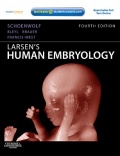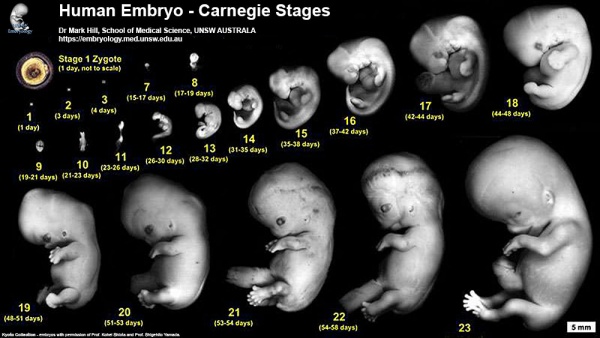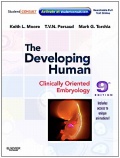ANAT2341 Embryology 2012
Introduction
The course coordinator is Dr Mark Hill, my office is located in Wallace Wurth ground floor room G20.
- ANAT2341 is a second semester course commencing in July 2012.
--Mark Hill 08:41, 21 June 2012 (EST) I am currently preparing the online course materials for 2012. Many links may still point to last year's pages.
Welcome to Embryology in 2012 and thank you for choosing this exciting topic! In the past 20 years as a researcher I have seen enormous changes in our understanding of this subject and the methods we employ to further our knowledge in this field. This topic and its associated methodologies are now found at the core of scientific investigations and key to current medical research.
This page will introduce the current course and link to related online resources (bookmark this as your start page). This is a new online resource, content and links will be added during your current course. Feel free to explore the site and prepare yourself for the upcoming course by some background reading.
Course Links
- ANAT2341_Course_outline_2012.pdf PDF Document - Course handout PDF 6 pages Clicking this link will automatically open the document in your web browser.
- ANAT2341 Course Timetable 2012 the current planned course timetable.
- Student Pages page containing links to all individual student pages and group project pages.
Template Pages containing no content: ANAT2341 Course Timetable 2012 | ANAT2341 2012 Students
The first 8 weeks of human embryological development.
Course details
Summary of the Course
This course will introduce embryological development as a major topic within medical sciences. Students completing this course will have a broad understanding of: human development, some animal models of development and current related research topics. Experts and researchers from within the field contribute to the current course.
Aims of the Course
- This course will enable students to explore and gain further understanding of embryology through the investigation of development in both humans and animal models with a direct emphasis of their application to emerging research and reproductive technologies.
- This course will enable students to broadly understand abnormalities in development and current applications to medical research.
Student learning outcomes
At the conclusion of this course the student will be able to:
- Describe the key events in early and systematic embryological development.
- Apply developmental theory to abnormalities of development and current medical research techniques.
- Complete tasks in scientific communication either online, written and by oral presentation.
- Work in small research groups and carry out peer assessment by completing an online group project.
Graduate Attributes
The students will be encouraged to develop the following Graduate Attributes by undertaking the selected activities and knowledge content. These attributes will be assessed within the prescribed assessment tasks.
At the conclusion of this course the student will be able to:
- Investigate embryological development by scholarly enquiry of research literature.
- Apply developmental theory to anatomical development.
- Undertake basic research by applying analytical and critical thinking.
- Create online individual and group projects that demonstrate initiative and collaborative work.
Textbooks
Either of the textbooks listed below are recommended for this course and page references to both are given in each lecture. Both textbooks available at campus bookshop. There are additional embryology textbooks that can also be used, consult course organizer. See also Embryology Textbooks
The Developing Human: Clinically Oriented Embryology (8th ed.)
Larsen’s Human Embryology (4th ed.)

|
Schoenwolf, G.C., Bleyl, S.B., Brauer, P.R. and Francis-West, P.H. (2009). Larsen’s Human Embryology (4th ed.). New York; Edinburgh: Churchill Livingstone.
|
Publisher Links: The Developing Human: Clinically Oriented Embryology | Larsen’s Human Embryology

